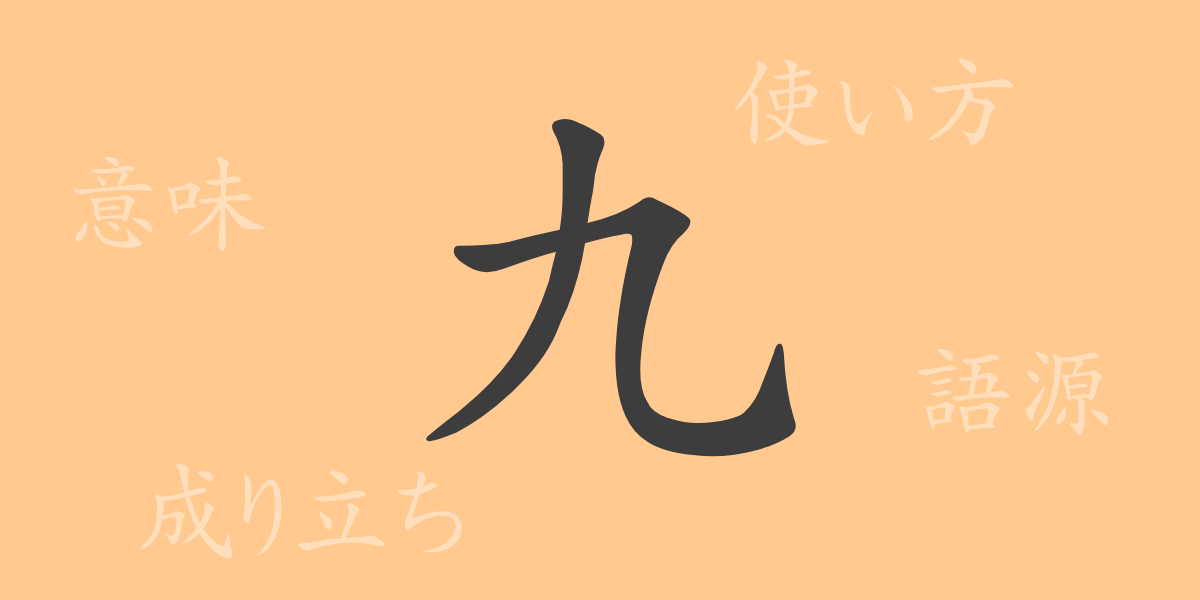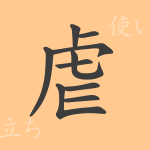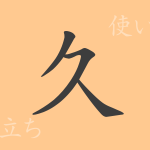In Japanese culture and language, kanji play a role beyond mere characters. Among them, the numeral “九” (きゅう, kyuu) holds a special place due to its unique shape, history, and cultural significance. This article delves into the common-use kanji “九” (きゅう, kyuu), exploring its origin, meaning, usage, readings, and related idioms and phrases to uncover its charm.
Origin of 九 (語源)
The kanji “九” (きゅう, kyuu) originates from ancient China’s counting system. It began as a pictograph representing a bent arm, symbolizing the last count in a sequence. This bent arm came to signify the number nine, the largest single-digit number. Over time, its shape evolved to the more abstract form we recognize today as “九” (きゅう, kyuu).
Meaning and Usage of 九 (きゅう, kyuu)
The kanji “九” (きゅう, kyuu) represents the number 9 and plays a crucial role as the largest single-digit number in mathematics. Additionally, “九” (きゅう, kyuu) is used in various contexts to signify “many” or “numerous.” For example, the Japanese idiom “九死に一生を得る” (きゅうしにいっしょうをえる, kyuu shi ni isshou o eru) means narrowly escaping death from a perilous situation. Thus, “九” (きゅう, kyuu) not only denotes a number but also conveys abundance and pivotal moments.
Reading, Stroke Count, and Radical of 九 (きゅう, kyuu)
The kanji “九” (きゅう, kyuu) has multiple readings in Japanese.
- Reading: The on-yomi (Chinese reading) is “キュウ” (kyuu) and “ク” (ku); the kun-yomi (Japanese readings) are “ここの” (kokono) and “ここのつ” (kokonotsu).
- Stroke count: “九” (きゅう, kyuu) is composed of 2 strokes.
- Radical: The radical is “乙” (おつ, otsu), which has a bent shape.
Idioms, Proverbs, and Expressions Using 九 (きゅう, kyuu)
Numerous idioms, proverbs, and expressions feature the kanji “九” (きゅう, kyuu) in Japanese. Here are a few examples:
- 「九州」 (きゅうしゅう, Kyushu): A region in Japan, literally meaning “nine provinces.”
- 「九分九厘」 (くぶくりん, kubu kurin): Meaning almost certain.
- 「九死に一生を得る」 (きゅうしにいっしょうをえる, kyuu shi ni isshou o eru): To narrowly escape death, surviving a life-threatening situation.
These expressions highlight the rich expressiveness of Japanese and the cultural importance of the number nine.
Summary on 九 (きゅう, kyuu)
Through this article, you can see that the kanji “九” (きゅう, kyuu) holds meanings far beyond being a simple number. Its simple yet powerful strokes have been ingrained in daily life over centuries. By understanding its various uses and meanings through words and idioms, you can deepen your appreciation of the Japanese language and culture.

























